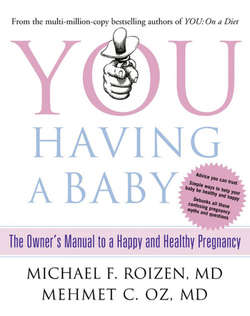Читать книгу You: Having a Baby: The Owner’s Manual to a Happy and Healthy Pregnancy - Michael Roizen F. - Страница 52
Crazy Cravings
ОглавлениеYou think that your affection for tilapia sundaes is, say, odd? That’s nothing compared to the cravings that some women get. Those who suffer from a condition called pica crave nonfood items such as dirt, clay, freezer frost, paper, paint chips, chalk, sand, soap, and cigarette ashes. That doesn’t mean that they’re crazed; it may mean that they’re suffering from an iron or zinc deficiency. (In some populations, up to 70 percent of pregnant women have pica.) While there are certainly risks associated with consuming some of these items, the biggest problem is that filling up on charcoal doesn’t provide your baby with adequate nutrition. The cravings generally go away with proper iron and zinc supplementation. The other bit of good news: Though it may have an effect on how a waiter looks at you,* pica does not have an effect on baby’s birth weight.
Let’s take cravings, for example, which 75 percent of pregnant women experience. Prior to pregnancy, you may have been a health food fanatic; now you find yourself craving deep-fried onion rings dipped in mayonnaise. Maybe you were a vegetarian; now you have visions of cheeseburgers dancing in your head. Hormones seem to be the most likely source of pregnancy cravings, just as they are for women’s premenstrual cravings of chocolate and carbohydrates (ditto for women who take progesterone for birth control or to relieve menopausal symptoms).
Before you flip off your feminine hormones and blame them for your Almond Joy addiction, consider that a craving is really designed to help you. The scientific speculation is that women crave foods that contain the nutrients they need (like vitamin C or potassium) or simply for calories—both of which may be necessary for fetal development. Makes sense. Our bodies alert us to deficiencies so that we can better protect our offspring or take care of ourselves (so we can better protect our offspring). Consider:
• Women may get cravings for salt because sodium is needed to balance their extra fluid volume during pregnancy.
• Cravings for dry, starchy food during the first trimester may be designed to help relieve nausea.
• Similarly, many cravings may be nature’s way to avert morning sickness, since women are more likely to feel nauseous on an empty stomach.
Appreciating these evolutionary advantages, however, won’t do much to make you feel better if you’re chin deep in a pile of potato chips. Food companies seem to try to seduce all of us to eat too much saturated fat, sugar, and salt. And sometimes we succumb. The trick is to make changes as soon as you realize you have gone off course; it’s not the first cookie that destroys your plans but the ones that follow. Our tips at the end of the chapter will help you keep those cravings in check so that you can do the same with your weight.
